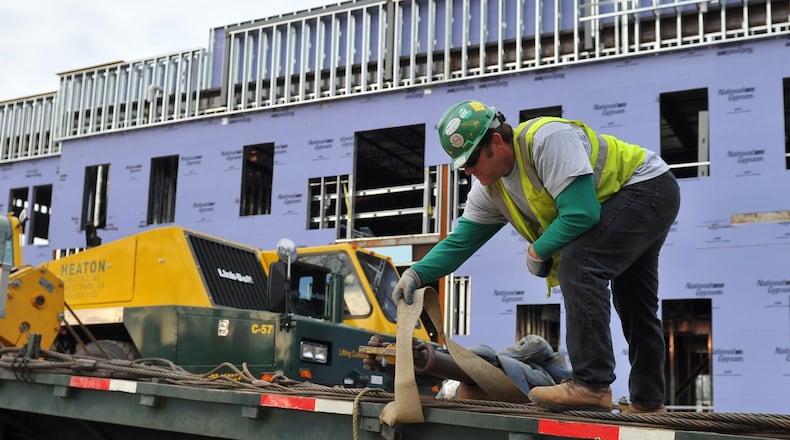January to February job gains (or losses) the last decade. In percentages.
January February
2005 5.3 5.5
2006 5.0 5.0
2007 4.6 4.4
2008 5.3 5.2
2009 8.6 9.0
2010 10.7 10.5
2011 10.3 10.0
2012 9.4 9.3
2013 8.8 8.4
2014 7.1 6.8
Source: Georgia Department of Labor.
Atlanta’s roaring home-building industry continues to fuel a surge in construction employment, with Thursday’s jobs report bolstering region-wide evidence that the economy is steadily improving.
The jobless rate across metro Atlanta dipped to 6.9 percent in February from 7.1 percent the previous month, according to the Georgia Department of Labor.
Economists expect Atlanta to add maybe 60,000 jobs this year, a healthy, if historically unspectacular rise in employment. Construction, and the accompanying specialty trades, will help lead the way as Atlanta resurrects one of its main economic pillars.
Metro Atlanta witnessed a 7.4 percent uptick in construction employment between February 2013 and February 2014 – the largest increase in any job category. It translated into 6,400 new jobs for carpenters, roofers, drywallers, brick masons, painters and plumbers.
The industry is looking for more builders. But they’re hard to find.
“Home sales are up, but labor is still behind the demand,” said David Ellis, executive vice president of the Greater Atlanta Home Builders Association. “Guys who left the industry will look around and say, ‘Hey, this market is coming back. Let’s get the band back together.’ It’ll take some time, but it’s one of those right-direction problems we have right now.”
Atlanta’s two-steps forward, one-step back jobless rate underscores the schizophrenic, yet largely positive direction of the local economy. Last December, for example, unemployment across the region stood at 6.8 percent. But then the holiday hires were let go and the jobless rate inched up again.
Unemployment dropped in February, as it usually does. Only twice during the last decade did the jobless rate rise in that month. Metro Atlanta has added 42,600 jobs since February 2013, when the unemployment rate stood at 8.4 percent.
Still, Atlanta’s rate lags the national average – 6.7 percent.
“The good news is that the sectors that did gain jobs last month were things like education, health services, manufacturing and, most important, construction,” said Labor commissioner Mark Butler.
He took particular satisfaction Thursday in February’s 23 percent drop in new claims for unemployment insurance.
The building industry was hammered during the recession. In boom times, builders in metro Atlanta applied for 60,000 single-family home permits a year. They sought maybe one-tenth that amount during the wicked downturn, according to Smart Numbers, a real estate analysis firm.
John Hunt, a senior analyst with Smart Numbers, expects 15,000 permits this year, a 60 percent increase over last year.
“We’ve said throughout the whole crisis that, until we fixed housing, job growth would not improve dramatically in Atlanta because it’s such a construction-based economy,” Hunt said. “A lot more houses are being built, small businesses are being re-engaged and people are going back to work.”
Construction, of course, is more than home building. Tall buildings require crane operators. Pipelines need backhoes and bulldozers. Factory builders demand engineers, pipefitters, welders.
“We’re slammed right now,” said Phil McEntyre, business manager for the Atlanta chapter of the International Union of Operating Engineers. He listed projects underway or planned: environmental work at two Georgia power plants; cell phone towers; power lines; stadiums for the Falcons and Braves; a nuclear power plant near Augusta; three Atlanta skyscrapers.
“It just looks like a lot of different types of work coming up,” McEntyre added. “That will keep local people working and pumping money back into the economy and keep everybody happy.”
Retirement and the bad economy chased away too many crane operators. So McEntyre’s local recently recruited a dozen apprentices – double last year’s amount — for the next generation of operators who can earn $37 an hour in pay and benefits.
The recession forced construction workers to take home improvement, warehouse or truck-driving jobs. Or else they moved out of state in search of work. Legislation in Georgia that targeted illegal immigrants – the construction industry was heavily Hispanic — further shrunk the labor pool.
“After the Great Crash, or the Apocalypse, so many people fled that it was very difficult to get framers or drywall installers,” said Michael Rosenberg, chief operating officer for Acadia Homes and Neighborhoods, which builds new homes in Cobb, Fulton and Gwinnett counties. “But the good news, from a labor perspective, is that people are starting to come back to Atlanta.”
About the Author
Keep Reading
The Latest
Featured


